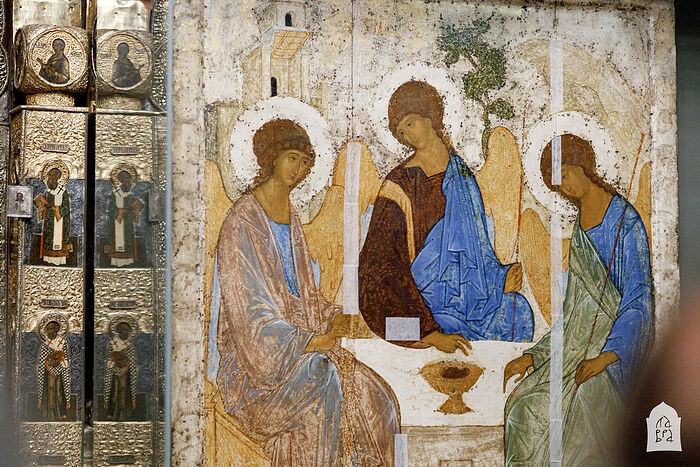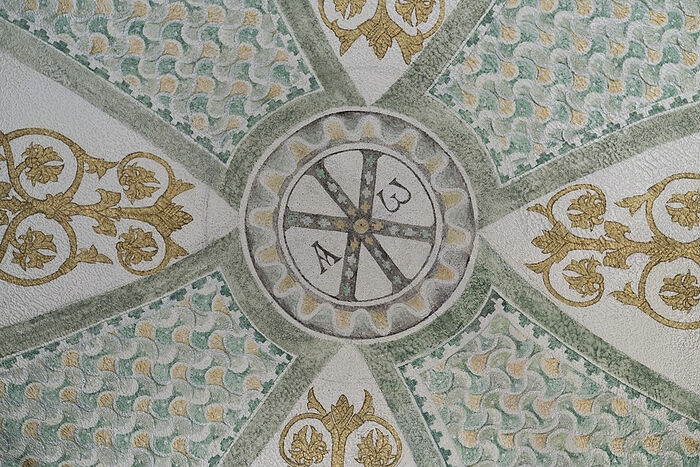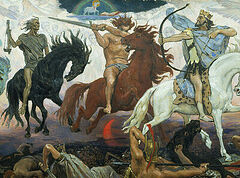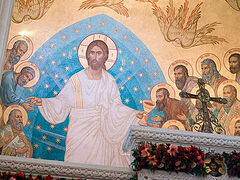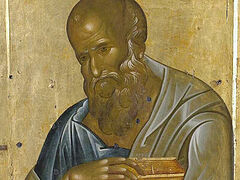Part 1A
Part 1B
Part 2A
Part 2B
Part 3A
Part 3B
Lamp of the Church of Ephesus
With God’s help, we’ll continue our talks today about the Revelation of the Apostle and Evangelist John the Theologian. Last time, we said that the Apostle John addresses seven Churches that are in Asia Minor. He wishes them grace … and peace, from Him Which is, and Which was, and Which is to come; and from the seven Spirits which are before His throne; And from Jesus Christ, Who is the faithful witness, and the first begotten of the dead, and the prince of the kings of the earth. Unto Him that loved us, and washed us from our sins in His own Blood, And hath made us kings and priests unto God and His Father; [Who] cometh with clouds; and every eye shall see Him, every man, and they also which pierced Him: and all kindreds of the earth shall wail because of Him. Even so, Amen (Rev. 1:4-7). All of this will definitely happen. And after this, Christ Himself, Who spoke with the Apostle and Evangelist John, continues: I am Alpha and Omega, the beginning and the ending, saith the Lord, Which is, and Which was, and Which is to come, the Almighty (Rev. 1:8). We said that this refers to the Holy Trinity. One of the most significant and frequent references to the Holy Trinity is in the text of Revelation.
We’ll now turn to chapter 1, verse 9, which says the following: I John, who also am your brother, and companion in tribulation, and in the kingdom and patience of Jesus Christ, was in the isle that is called Patmos, for the word of God, and for the testimony of Jesus Christ (Rev. 1:9). John the Apostle and Evangelist, our brother and partner in tribulation, in the kingdom and patience, known to us by the power of our Lord Jesus Christ, was in exile on the island of Patmos for the word and testimony of God. He says this here so his further words would be trustworthy, assured, not words thrown to the wind, vague and unclear; so he gives his name, saying: “It’s John, your brother, who participates with you in sorrows, in the kingdom, and in patience by the power of Jesus Christ.” He says he ended up on the island of Patmos, where they sent him to prison for his testimony of Christ and for the word of God.
You see that the way of the Holy Apostles resembled the life of Christ. They weren’t successful in a worldly way, not everything went well in their lives, they had no worldly power or authority, but they were people who went through many sorrows, difficulties, trials, and exiles. And note that the Apostle John wrote Revelation at the end of his life. He was already quite old, but despite this, he was exiled to the island of Patmos. In those days of course, Patmos wasn’t like it is today, where we go for vacation. It was an arid island, unsettled. And if people were exiled there, it means it was a very difficult place to live.
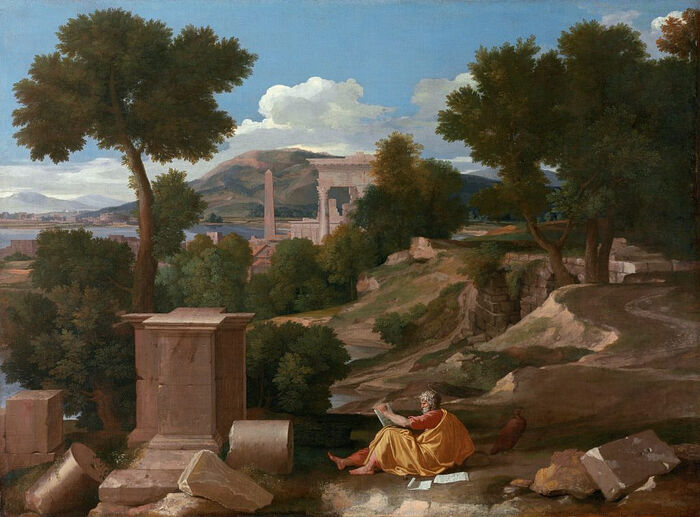 Nicolas Poussin, Landscape with St. John on Patmos
Nicolas Poussin, Landscape with St. John on Patmos
He was there because he testified about Jesus Christ; he was imprisoned on Patmos for preaching Christ and for the word of God. The Apostle experienced many sorrows.
When we say “tribulations,” we don’t mean just the sorrows and strained circumstances in which the saints found themselves. The word “tribulation” (from the Greek “η θλίψη”—“to melt”) means “complete crushing” (from the Greek “λιώνω”), when a man “melts,” “is crushed.” Therefore, through tribulation, patience, and faith, the saints became partakers of the coming Kingdom of Christ.
But only the man who has faith has patience. If a man has little faith, then he’s impatient; he wants everything to happen quickly, this minute, and in the way that he wants it. He quickly loses his composure and hope and finds himself in a state of panic. A patient man believes in God and awaits a resolution of circumstances from Him.
In the tenth verse we read: I was in the Spirit on the Lord’s Day, and heard behind me a great voice, as of a trumpet (Rev. 1:10). The Apostle says he was in a state of rapture in the Holy Spirit—that’s how we should understand the words I was in the Spirit. He was in a moment of the visitation of grace, as today’s elders who had such experience would say. The Holy Spirit enraptures a man and reveals to him the events that are going to happen. As we already said in our preliminary talks, many people talk about their revelations and visions today.
However, the experience of the visitation of the Holy Spirit differs from the experience of being deceived by satan in that the people of God are conscious and understand what’s happening; they don’t lose clarity. Their awareness doesn’t leave them; they know who they are, where they are; they know that they see what God shows them, not someone who suddenly came out of nowhere. They know it’s a visitation of God, not the result of their virtues and their own strength. And most importantly, these people are distinguished by deep humility. These are humble, spiritual, ascetic people whom the Church knows and can testify to.
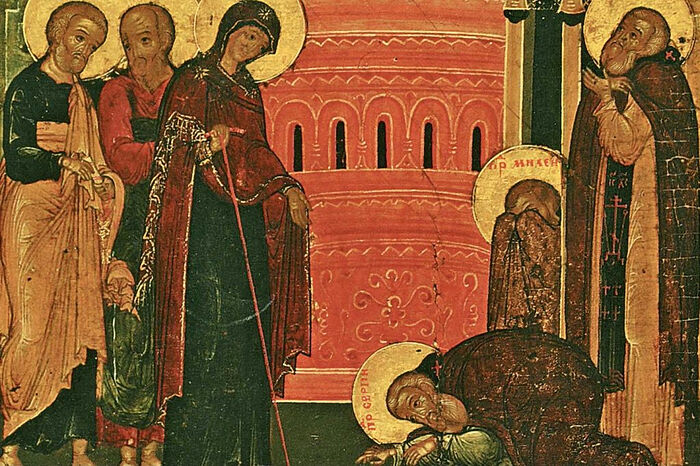 The Theotokos appears to St. Sergius of Radonezh, 17th C.
The Theotokos appears to St. Sergius of Radonezh, 17th C.
People who are characterized by egotism, vainglory, and pride, who believe that “only us and no one else,” who think that everything they see and know, everything they experience, is indisputable, because they say so. Such people don’t have the Spirit of God within them. They’re in a state of prelest, of delusion. Egotism is the seal of delusion. Humility is the seal of grace. People with grace know themselves; they don’t lose their identity. They’re not like people who have fallen, who have lost their consciousness and seen and done some things in this state. Then it may turn out to be true, but we mustn’t forget that the devil has power if a man allows him to mimic the action of grace. The devil often parodies the works of God. He tries to behave like God in order to deceive people. We have to be very careful. And first of all, the seal of truth is the Church, then holiness, a virtuous life, and the humility of a man who has such experience.
Thus, the Apostle John was in a state of grace on a Sunday. This is the first time in the New Testament that the day after Saturday is called “the Lord’s Day.” It wasn’t called that before—we Christians started calling it that. This is the Lord’s Day, dedicated to the Lord. The Jews called it “the day after the Sabbath.”
The Apostle was in a state of grace on Sunday and heard a loud voice coming from behind him. The voice was like the sound of a trumpet. A strong voice. Who was it that spoke? We read in the next verse: I am Alpha and Omega, the first and the last: and, What thou seest, write in a book, and send it unto the seven Churches which are in Asia; unto Ephesus, and unto Smyrna, and unto Pergamos, and unto Thyatira, and unto Sardis, and unto Philadelphia, and unto Laodicea (Rev. 1:11).
The number seven always serves as a sign of completeness; that is, these words were to be conveyed to “all the Churches,” but especially to those Churches that were in the area of Ephesus: Ephesus, Smyrna, Pergamos, Thyatira, Sardis, Philadelphia, and Laodicea.
None of these Churches exist today. They were all in Asia Minor. They were taken away by our friends the Turks. I’m saying this to show you that God isn’t connected to places. God has no geographical ties. This is evidenced by the fact that all the Churches that the Holy Spirit addressed have disappeared. They disappeared because of our lack of ingenuity and intelligence. God save us! I don’t know what else is going to disappear. God isn’t connected to a place; He is beyond the bounds of places; He’s not dependent on geography and doesn’t have human senses and feelings; He doesn’t depend on all that. But we humans need to be careful.
So, write in a book, and send it unto the seven Churches. The Lord lists those Churches that were already founded by the Apostle and Evangelist John at that point, and later we’ll see how He speaks with these Churches.
And I turned to see the voice that spake with me. And being turned, I saw seven golden lampstands (Rev. 1:12). The Apostle heard a voice behind him, like a trumpet, speaking to him, and he turned around to see who was talking to him. Having turned around, he saw seven golden lampstands. The Greek word used here is “λυχνοστάτης”—“stand,” “lamp holder,” not “λύχνος”—“lamp.” The Holy Fathers explain that “lampstand” is used here because the Church holds a lamp—the Gospel of Christ. Christ is the true Light, and the Church holds this lamp—it’s the stand for the lamp.
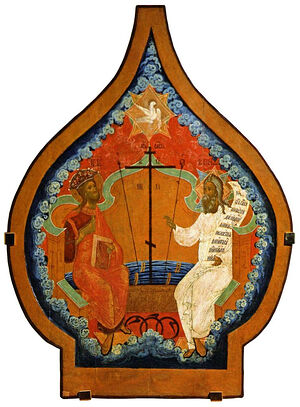 The Holy Trinity And in the midst of the seven lampstands one like unto the Son of Man, clothed with a garment down to the foot, and girt about the paps with a golden girdle (Rev. 1:13). Amidst the lampstands, he saw Someone like a man. Why is he like a man? The Apostle talks about it below. He was clothed in a tunic covering His feet and girded with a golden belt. These were the garments of bishops and kings, to show the hierarchical and royal dignity of our Lord Jesus Christ, of Whom all the prophecies spoke. Now the Apostle John is beholding a vision. The Prophet Daniel saw and described practically the same vision in the Old Testament.
The Holy Trinity And in the midst of the seven lampstands one like unto the Son of Man, clothed with a garment down to the foot, and girt about the paps with a golden girdle (Rev. 1:13). Amidst the lampstands, he saw Someone like a man. Why is he like a man? The Apostle talks about it below. He was clothed in a tunic covering His feet and girded with a golden belt. These were the garments of bishops and kings, to show the hierarchical and royal dignity of our Lord Jesus Christ, of Whom all the prophecies spoke. Now the Apostle John is beholding a vision. The Prophet Daniel saw and described practically the same vision in the Old Testament.
If we turn to Daniel chapter 7, we’ll read about the vision of the Ancient of Days, Which appeared the same way the Apostle and Evangelist John describes Him. This is another proof that the prophets of the Old Testament saw Christ.
In the New Testament, Christ is incarnate as a man, but in the Old Testament, He has no human nature. Christ, the Bodiless Word, spoke with the Prophets in the Old Testament; but in the New Testament, it’s the same Christ—the Incarnate Word.
Thus, He saw a man dressed in a tunic and girded about the chest with a golden belt. The Fathers asked why the belt was about the chest. Did you know that the girdle has a symbolic meaning? In the past, in antiquity, people always wore a girdle, including the Jews. Let us recall the girdle of the Most Holy Theotokos.
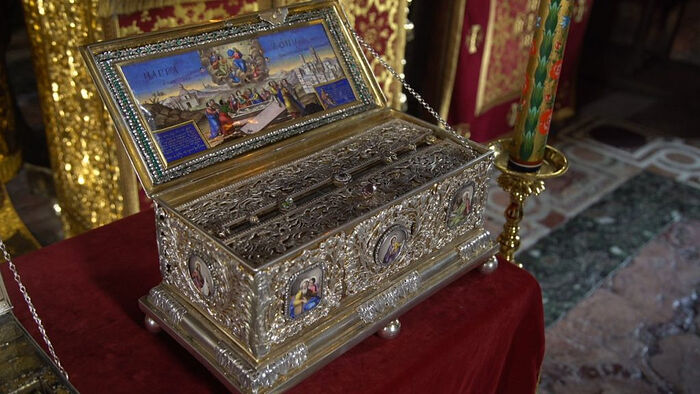 Reliquary with the girdle of the Most Holy Theotokos
Reliquary with the girdle of the Most Holy Theotokos
When Scripture speaks of the Holy Forerunner and Baptist of the Lord John, it says he was girded with a leather belt about his waist, which is why we monastics wear a leather belt. And priests wear a belt during the services. Therefore, kings and warriors in the Old Testament wore belts. Scripture says: Thou therefore gird up thy loins, and arise, and speak unto them all that I command thee (Jer. 1:17). The belt symbolizes chastity, abstinence, strength. It’s a symbol of the mortification of the old man. Therefore, St. John the Forerunner wore a leather belt, to demonstrate the mortification of the passions. The Jews believed that the desiring aspect of man is located in the area of the womb, so they tied a belt there, symbolizing chastity, which they should maintain.
Do you remember the old yiayias who always wore a thin belt? Sometimes they were woven. You know, the Theotokos had the same kind. When I lived at Vatopedi and took care of the precious relics, I often took the Theotokos’ belt out of the reliquary to wipe off the dust and keep everything in order. The belt is very small, two fingers wide. It consists of three pieces. It used to be bigger, but it was stolen at one point, after which the fathers cut it into pieces so it wouldn’t be completely lost. It’s woven from camel hair. The Theotokos herself wove it and embroidered it with golden and green threads.
Later, in gratitude for healing, Empress Zoe added the embroidery that has been preserved to this day. The Theotokos gave this belt to the Apostle Thomas as a blessing when they met. It reminds me of those narrow belts that our yiayias always wore.
I remember whenever my yiayia would sew a dress, she always made a small belt that she tied at the top of those beautiful dresses that women wore then. Even clothes mattered.
The order for the Sacrament of Baptism says the newly illumined should wear a robe, a white hat, and a belt. Why a belt? Because he’s a soldier now. He was baptized, girded with a belt, and he goes to fight satan, to defeat him. He needs to be girded. Therefore, a monk always wears a belt. At the time of the tonsure, we’re given monastic garments, including a belt. Moreover, the belt is leather, not fabric, or something else.
The Holy Fathers explained that the Lord wore His girdle about His chest because He was free from passions and sins.

